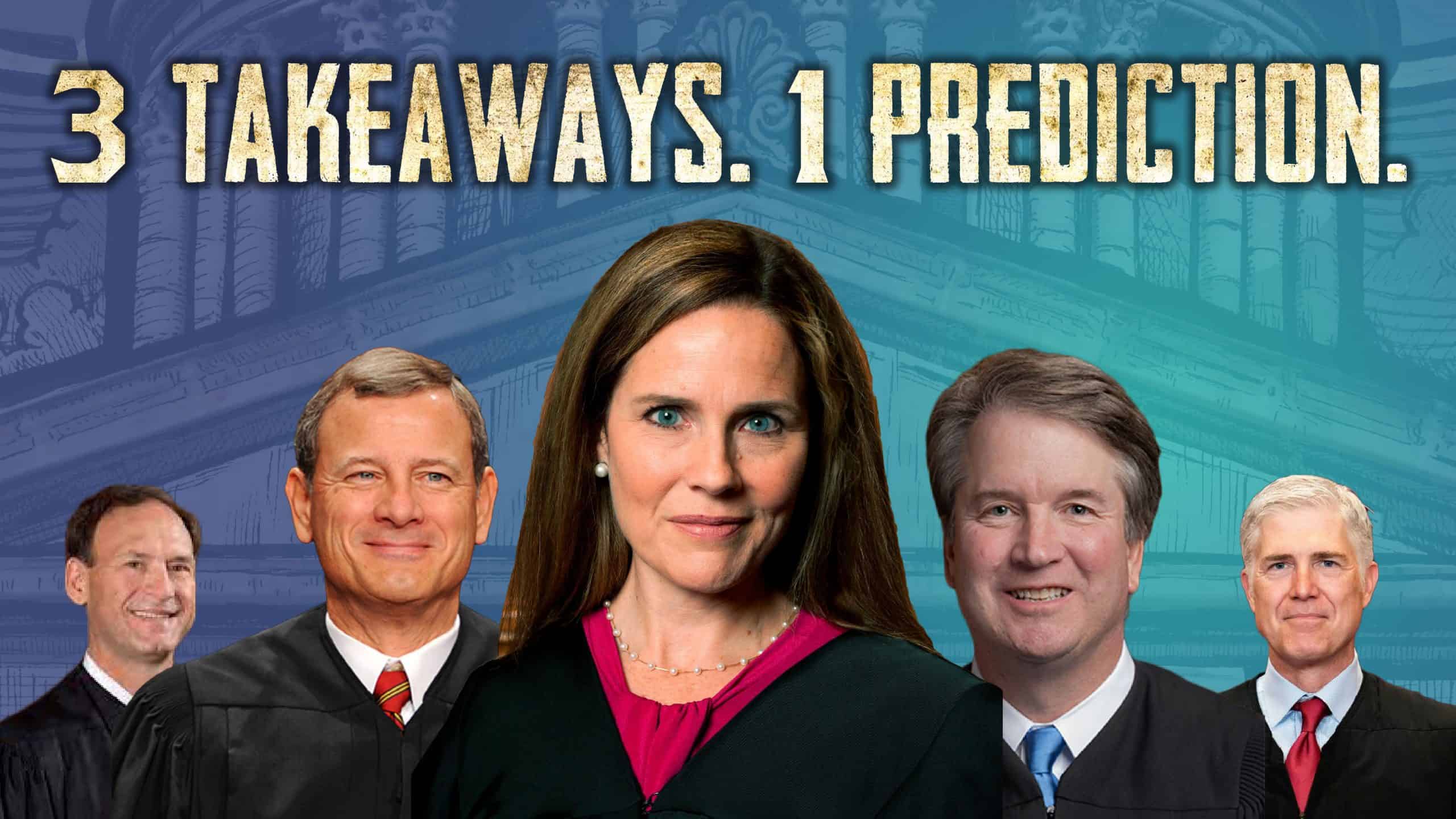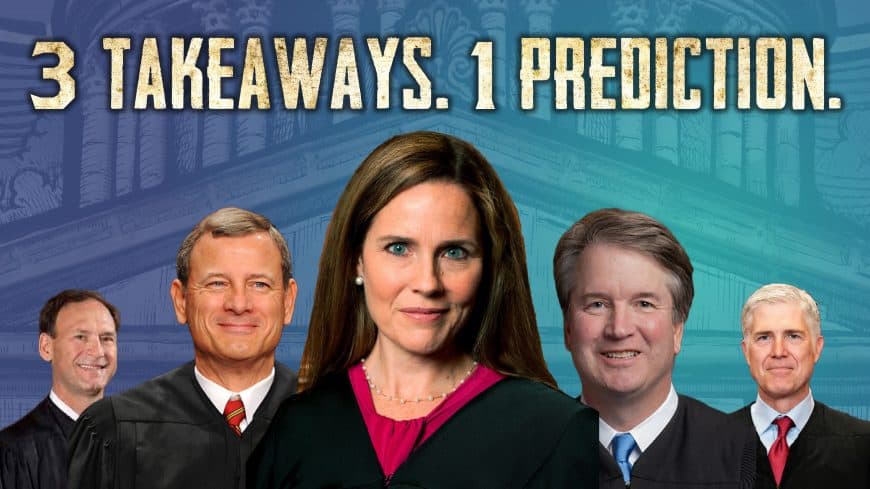
This morning, the supreme court heard oral arguments in Dobbs v. Jackson Women’s Health, a case revolving around the Mississippi Gestational Age Act of 2018 which prohibited abortion in the state after 15 weeks. The law, of course, was immediately enjoined by the lawyers of a Mississippi child sacrifice center and began the process of working its way up through the appellate courts until it reached the supreme court.
The court could rule four different ways in this case. They could:
- Strike down the 15-week ban by upholding the supposed absolute right to abortion pre-viability.
- Uphold the 15-week ban by ruling that the Constitution is neutral on abortion and thereby leave the issue to Congress and the States.
- Uphold the 15-week ban by compromising and rolling back the line established in Planned Parenthood v. Casey from roughly 20 weeks to 15 weeks or some other arbitrary line before 15 weeks.
- Uphold the rights to life and equal protection by abolishing abortion.
The fourth option is what the court ought to do, but there is likely no chance of it actually happening. Not even Thomas, the most aggressively pro-life justice is supportive of the theory that preborn children are people under the Constitution. As for which of the other three outcomes is most likely, we will get to that after we address the highlights from oral arguments.
Three Takeaways
1) Mississippi is Going For Roe’s Full Reversal, But Not Equal Protection
The Pro-Life Movement has long been defined by leaders who exhibit extreme timidity and tolerance for compromise. The Casey decision, in which an 8-1 Republican-appointed majority voted to maintain legal abortion, was the most crushing defeat in the history of the Pro-Life Movement. Yet pro-life leaders such as Focus on the Family VP Gary Bauer were claiming victory for unborn children because some of the regulations in question in that case were allowed to stand.
Mississippi Attorney General Lynn Fitch began her brief filed with the court in October by calling the justices to overturn Roe v. Wade but then hedged her bets, arguing that even if there is a Constitutional right to abortion, there’s no reason that the court couldn’t allow the 15-week ban: “Even if the ‘liberty’ secured by the Due Process Clause did protect some right to abortion, nothing in constitutional history or tradition supports tying such a right to viability.” Until this morning, it remained to be seen how tolerant Mississippi Solicitor General Scott Stewart would be of the compromise route.
Fortunately, he didn’t appear to have much interest in hedging bets. While he acknowledged the possibility of the compromise route, he focused his argumentation on opposing the key principles undergirding Roe and Casey. In an exchange with Justice Thomas on the subject, Stewart argued against the compromise route.
Thomas: If we don’t overrule Casey or Roe, do you have a standard that you propose other than the viability standard?
Stewart: It would be, your honor, a clarified version of the undue burden standard. I would emphasize… that no standard other than the rational basis review that applies to all laws will promote an administrable, workable, practicable, consistent jurisprudence that puts matters back with the people. I think anything heightened here is going to be problematic.
It would have been in line with the pro-life leaders’ historic strategy for Stewart to aim for compromise and incrementalism, but he instead pointed out only the flaws in the compromise scheme when asked about it.
But there were issues with Stewart’s argumentation. He argued that the Constitution is neutral on the subject of abortion, jettisoning the less popular but more Biblically and Constitutionally faithful argument that preborn children are fully equal in value to everyone else and should be afforded the equal protection of the law. If life begins at conception — and everyone knows it does, despite the pro-abortion justices pretending it’s a mystery — there is no option but abolition given the Constitutional guarantees of life and equal protection. This decision by Stewart is harmful to the cause long-term.
2) The Pro-Aborts Have Nothing
The pro-abortion attorneys and justices relied on two main arguments in defense of Roe and Casey: the first being bodily autonomy and the second being stare decisis, that is, the principle that the court should never or only in extreme circumstances reverse its previous rulings. Both arguments were obliterated by questions from Alito and Thomas.
U.S. Solicitor General Elizabeth Prelogar, arguing in favor of protecting legal abortion on stare decisis grounds, engaged in a back-and-forth with Alito regarding whether decisions could ever be overruled simply on the basis of their being wrongly decided.
Prelogar: “Casey properly perceived that a decision to overrule nevertheless, perhaps based on a conclusion that the justices thought the case was wrongly decided in the first instance, would run counter to the ability of stare decisis to function as a cornerstone of the rule of law in this context.
Alito: “Is it your argument that a case can never be overruled simply because it was egregiously wrong?”
Prelogar: “I think that at the very least, the state would have to come forward with some kind of materially changed circumstance or some kind of materially new argument, and Mississippi hasn’t done so in this case.”
Alito: “Really? So suppose Plessy versus Ferguson was re-argued in 1897, so nothing had changed. Would it not be sufficient to say that was an egregiously wrong decision on the day it was handed down and now it should be overruled?
Prelogar: “It certainly was egregiously wrong on the day that it was handed down, Plessy, but what the Court said in analyzing Plessy to Brown and Casey was that what had become clear is that the factual premise that underlay the decision, this idea that segregation didn’t create a badge of inferiority, had been entirely mistaken.”
Alito: “So… is it really your answer that we needed all the experience from 1896 to 1954 to realize that Plessy was — was wrongly decided? Would you answer my question? Had it come before the Court in 1897, should it have been overruled or not?
Prelogar: “I think it should have been overruled, but I think that the factual premise was wrong in the moment it was decided, and the Court realized that and clarified that when it overruled in Brown.”
Alito: “So there are circumstances in which a decision may be overruled, properly overruled, when it must be overruled simply because it was egregiously wrong at the moment it was decided?”
Prelogar: “Well, I think every other stare decisis factor likewise would have justified overruling in that interest, that actually it would run counter to any notion of reasonable reliance, that it was not a workable rule, that it had become an outlier in our understanding of fundamental freedoms.”
Alito: “There was a lot of reliance on Plessy. The south built up a whole society based on the idea of white supremacy. So there was a lot of reliance. It was — it was improper reliance. It was reliance on an egregiously wrong understanding of what equal protection means. But your answer is — I don’t — I still don’t understand — I still don’t have your answer clearly. Can a decision be overruled simply because it was erroneously wrong, even if nothing has changed between the time of that decision and the time when the Court is called upon to consider whether it should be overruled? Yes or no? Can you give me a yes or no answer on that?”
Prelogar: “This Court, no, has never overruled in that situation just based on a conclusion that the decision was wrong. It has always applied the stare decisis factors and likewise found that they warrant overruling in that instance. And — and Casey did that. It applied the stare decisis factors. If stare decisis is to mean anything, it has to mean that that kind of extensive consideration of all of the same arguments for whether to retain or discard a precedent itself is an additional layer of precedent that needs to be relied on and can form a stable foundation of the rule of law.”
In the more than three-minute exchange, Prelogar was twisted into a knot and refused to plainly answer Alito’s question. She couldn’t give a plain “yes” because she had already argued for keeping Roe and Casey on the grounds that new information is always necessary in order to overturn precedent. But she couldn’t say “no” because she doesn’t want to admit that the supreme court needed to wait 60 years to overturn state-mandated segregation. By the end of the exchange, she simply dodges the question entirely by answering a completely different question about whether the court has overruled a decision without a change in the facts of the case.
When people begin answering their own questions instead of the ones asked of them, you know they’re on the run. There is no good reason to maintain wicked, unconstitutional rulings and everybody knows it. Stare decisis is nothing more than a useful talking point whenever one favors a particular precedent.
Regarding bodily autonomy, Justice Thomas pressed Center for Reproductive Rights attorney Julie Rikelman on her view of the limits of it. He asked her whether a woman who causes permanent harm to her unborn child by ingesting drugs during pregnancy prior to viability should be held liable for child neglect.
She responded: “I would say that the states can certainly regulate [drug use] throughout pregnancy, both before and after viability, to preserve fetal life and to preserve the woman’s health. The Court has said, however, there is — there are other constitutional issues at stake, for instance, in the Ferguson case, that states still can’t violate women’s Fourth Amendment rights.”
The absurdity of Rikelman’s argument is apparent to anyone with a functioning brain. She admits that in the exact same moment in the child’s life — say, 8 weeks — she believes that states cannot protect that child from being murdered, while affirming that states can protect the child from harm caused by drug use. In Rikelman’s world, you can’t non-lethally harm preborn children, but you can rip their heads off. This is no different than the legal schizophrenia of antebellum white supremacists who wanted black people to count as people for population counting and other purposes, but did not want black people to have the rights and protections afforded to citizens.
Embracing pro-abortion reasoning takes not only a depraved mind, but the rejection of reason that comes with it.
3) It All Comes Down to the Conservative Moderates Resisting Roberts’ Compromise
It was, as always, apparent that left-wing activist Justices Sonya Sotomayor, Stephen Breyer, and Elena Kagan strongly desire that the legal slaughter of preborn children remain court-protected. It was also clear that Justice Thomas desires the complete overturning of Casey and Roe. He has authored numerous opinions in the past making clear his belief that “Our abortion precedents are grievously wrong and should be overruled.” No other justice has ever joined him in this opinion, however.
We know how Thomas, Sotomayor, Breyer, and Kagan will rule, leaving the outcome of the case to the other five Republican-appointed justices: John Roberts, Samuel Alito, Neil Gorsuch, Brett Kavanaugh, and Amy Coney Barrett.
Roberts tipped his hand very transparently, focusing almost exclusively on arguing for concepts which would provide him the ability to pursue the compromise scheme. While questioning Rikelman, he responded to her claims about the supposed harms that would come to women if the law were allowed to go into effect by asking “If it is really an issue about choice, why is 15 weeks not enough time?” Rikelman responded by arguing that pro-life laws being passed around the country could ban abortion earlier than 15 weeks, but Roberts immediately brought the conversation back the 15-week line: “I know, but I’d like to focus on the 15-week ban because that’s not a dramatic departure from viability.”
Roberts didn’t want to address going any further than 15-weeks, and was making the case for 15 weeks as a moderate compromise. Combine this line of questioning with Roberts’ statements throughout the hearing about the undue burden standard not necessarily being tethered to the viability line and you get a very clear picture of a man intending to maintain the same undue burden standard laid out in Casey while rolling back the line from viability to around 15 weeks.
The question then becomes: do Alito, Gorsuch, Kavanaugh, and Barrett follow Thomas in overturning Roe completely? Or do they follow Roberts in establishing a new (but just as evil and arbitrary) 15-week line at which abortion can be prohibited?
Prediction
All six Republican-appointed justices seemed to posture themselves against the arguments made by the pro-abortion attorneys, a fact which has pro-lifers already celebrating and pro-choicers lamenting what they both believe could be the impending demise of Roe and Casey.
The problem with this thinking is that even if it is correct, there is no guarantee the court will overturn its abortion precedents completely rather than simply roll back the line five weeks; which, for reasons explained in our rapid reaction video earlier this afternoon, would actually be the worst case scenario for preborn children and the cause of justice.
The question is whether there are at least five votes to completely overturn Roe. I think Roberts is all but certain to oppose such an effort. Roberts wouldn’t even overturn abortion precedent in the case of the insignificant regulations at issue in the 2020 June Medical case. Roberts authored the majority decision in that ruling, stating that even though he voted to uphold nearly the exact same regulation four years earlier in the Hellerstedt case, precedent is too important to overrule. If he won’t overturn precedent to allow a measly regulation that does nothing, he’s very unlikely to overturn all current American abortion jurisprudence to approve of complete prohibitions on abortion.
That’s four votes against and one vote in favor of overturning Roe and Casey, meaning that all four remaining justices would have to support Thomas’ efforts for a full reversal, and none of them have ever signed onto one of Thomas’ opinions calling for it.
Given his particularly aggressive lines of questioning pursued against the pro-abortion lawyers, I would estimate Alito has a good chance of joining Thomas. That makes two. But I saw nothing from any of the other three justices that would lead me to believe they back a full reversal in this case. As a point to the contrary, all three have been very cautiously avoiding issuing broad rulings in favor of social conservatives thus far in their SCOTUS careers.
I believe the most likely outcome is for at least one of Kavanaugh, Gorsuch, and Barrett — possibly two or all three — to join Roberts’ compromise route. That would result in a 6-3 controlling opinion to uphold the 15-week ban, but retain the undue burden at that point, with Thomas writing a separate concurrence calling for complete reversal and possibly being joined by one-to-three other justices. This would result in little to no difference in American abortion law.
Another outcome that can’t be overlooked is the possibility of wildcard betrayals that lead to Casey and Roe being upheld in full. In Casey, no one saw coming the coalition of Reagan and Bush-appointees (David Souter, Anthony Kennedy, and Sandra Day O’Connor) who joined to determine the outcome of the case in favor of legal child sacrifice. If an 8-1 Republican-appointed majority can uphold legal child sacrifice in full, the current 6-3 majority — or really, 5-4 majority, considering Roberts’ consistent betrayals — certainly can.
To put it in percentages, I would say there’s a 60 percent chance of a 15-week compromise, 20 percent chance of total reversal, and 20 percent chance of the court doubling down (for the umpteenth time) on Roe.
Of course, none of these possibilities effect the immutable obligations of every American. Whatever the court has said in past opinions or will opine in this case, you, brother or sister, have an obligation to demand your governing officials obey Christ and uphold the Constitution by abolishing abortion. You have a duty to rescue those being led to slaughter.
Calling for defiance of Roe and immediate abolition is the only Biblically justifiable response to a court opinion ordering states to allow child sacrifice within their borders. Further, calling for abolition through ignoring Roe is the best way to get the court to overturn Roe. If they sense the states and the people are on the verge of abolishing abortion and exposing the court as a paper tiger, the justices will be more likely to correct their wrongs.
If you would like to learn more about how to do the work of abolishing abortion, fill out our contact form. And everyone reading this should make sure to connect with us by email and social media at the links below!
Three things to do!
- Big tech is cracking down on our ability to reach you! Our social media reach has been greatly decreased in recent months. To make sure you are not missing important content and news about abolition bills from Free the States, sign up for email updates!
- Be an activist! Convert people in your community to abolitionism. The best brief resource in the Abolitionist Movement for turning pro-lifers into abolitionists is the Are You An Abolitionist pamphlet. The best quadfold for outreach to pro-aborts and evangelism is the Abortion is Murder And Everybody Knows it quadfold. You can pick up copies from the Free the States store, along with t-shirts, drop cards, stickers, and activism signs!
- Everything we produce is possible because of the support of our donors. Help fund the fight to abolish abortion! Help us add staff and expand our programs by becoming a monthly supporter of Free the States!



